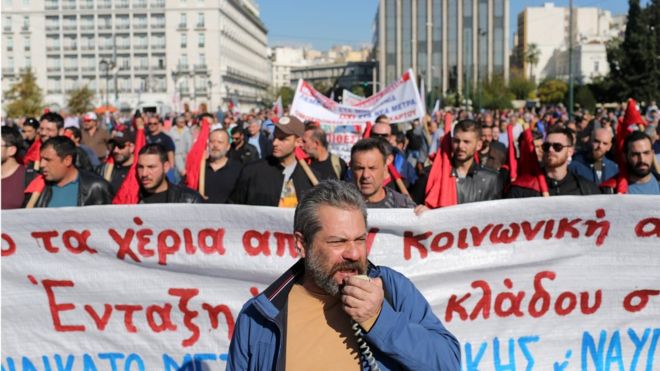The main unions appealed for members to walk out against the terms of Greece`s third eurozone bailout.
The government agreed to push through tax rises and spending cuts in return for €86bn (£60bn) in rescue loans.
MPs have already voted to raise the retirement age and get rid of most early retirement benefits, and reduced rates of sales tax on some of the big Greek islands have been scrapped.
But the main civil servants` union ADEDY and the GSEE private sector union objected to proposals to scale back supplementary pensions and merge pension funds. They were joined by communist-affiliated union PAME.
Metro, ferry and suburban rail services were shut down, schools were closed and hospitals had only emergency staff levels. Buses and trolley buses were providing limited services.
Museums and archaeological sites were also shut and news bulletins, newspapers and websites were disrupted because journalists had walked out.
Home loans
Although general strikes became regular events in Greece in the years following its first eurozone bailout in 2010, this was the first called since Syriza came to power.
After reluctantly agreeing to Greece`s third international bailout in five years in August, Mr Tsipras called an election and was returned to power in September with 35% of the vote.
Despite agreeing to a series of reforms, Greek officials are currently locked in a dispute with eurozone officials over bad home loans.
The Athens government is trying to avoid indebted Greeks losing their homes, but creditors want an agreement on a mechanism for tackling non-performing home-loans before they unlock €10bn to recapitalise Greek banks. A separate €2bn bailout instalment is also at stake.
There was some good news for the Greek economy on Thursday when officials announced that unemployment had fallen to 24.9% in August, the lowest level since June 2012.
More about:
















































